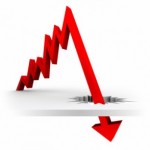
“It is now just a matter of time before the U.S. central bank follows the central banks of Japan, the EU, Denmark, Sweden and Switzerland in setting negative rates on reserve deposits. The goal of such rates is to force banks to lend their excess reserves. The assumption is that such lending will boost aggregate demand and help struggling economies recover. Using the same central bank logic as in the financial crisis, the solution to a debt problem is to add on more debt. Yet, there is an old adage: you can bring a horse to water but you cannot make him drink! With the world economy sinking into recession, few banks have credit-worthy customers and many banks are having difficulties collecting on existing loans .. Central bank policies have also driven government bond yields into negative territory. Nearly $7 trillion of government bonds are currently trading at negative rates .. The more you interfere with interest rates, the more you create a misalignment between demand and supply across time, and the greater will be the adjustment to realign output with demand to return the economy to sustainable economic growth with rising standards of living (see here and here). Negative rates will only ensure an ever greater misalignment between output and demand .. Meanwhile, a goal of some of the attendees at Davos and others has been to push the world toward a cashless society since an increase in cash holdings would limit the effectiveness of negative rates. They know that if they eliminate cash, central banks will have greater control over the money supply and the ability to guide the economy toward their macroeconomic goals .. The best monetary policy, however, is no monetary policy at all, and central bankers should take an extended holiday so that the world economy can finally heal itself.
– Austrian School Economist Frank Hollenbeck




 02/17/2016 - Why Negative Interest Rates Will Fail
02/17/2016 - Why Negative Interest Rates Will Fail


